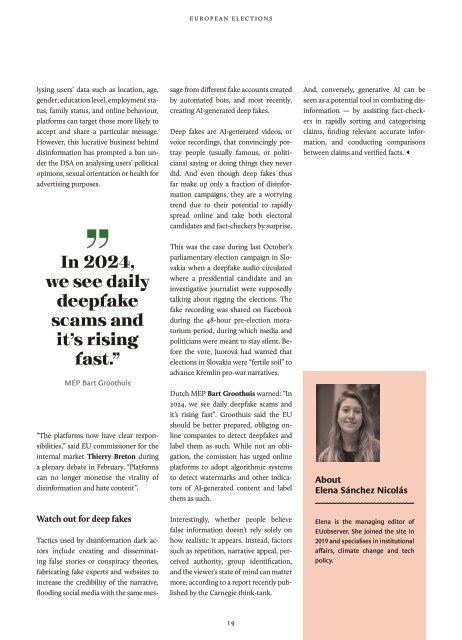EU Elections
EUobserver's guide to the 2024 European Parliament Elections.
EUobserver's guide to the 2024 European Parliament Elections.
- No tags were found...
You also want an ePaper? Increase the reach of your titles
YUMPU automatically turns print PDFs into web optimized ePapers that Google loves.
<strong>EU</strong>ROPEAN ELECTIONS<br />
lysing users’ data such as location, age,<br />
gender, education level, employment status,<br />
family status, and online behaviour,<br />
platforms can target those more likely to<br />
accept and share a particular message.<br />
However, this lucrative business behind<br />
disinformation has prompted a ban under<br />
the DSA on analysing users’ political<br />
opinions, sexual orientation or health for<br />
advertising purposes.<br />
Tactics used by disinformation dark actors<br />
include creating and disseminating<br />
false stories or conspiracy theories,<br />
fabricating fake experts and websites to<br />
increase the credibility of the narrative,<br />
flooding social media with the same message<br />
from different fake accounts created<br />
by automated bots, and most recently,<br />
creating AI-generated deep fakes.<br />
Deep fakes are AI-generated videos, or<br />
voice recordings, that convincingly portray<br />
people (usually famous, or politicians)<br />
saying or doing things they never<br />
did. And even though deep fakes thus<br />
far make up only a fraction of disinformation<br />
campaigns, they are a worrying<br />
trend due to their potential to rapidly<br />
spread online and take both electoral<br />
candidates and fact-checkers by surprise.<br />
And, conversely, generative AI can be<br />
seen as a potential tool in combating disinformation<br />
— by assisting fact-checkers<br />
in rapidly sorting and categorising<br />
claims, finding relevant accurate information,<br />
and conducting comparisons<br />
between claims and verified facts. ◄<br />
In 2024,<br />
we see daily<br />
deepfake<br />
scams and<br />
it’s rising<br />
fast.”<br />
MEP Bart Groothuis<br />
“The platforms now have clear responsibilities,”<br />
said <strong>EU</strong> commissioner for the<br />
internal market Thierry Breton during<br />
a plenary debate in February. “Platforms<br />
can no longer monetise the virality of<br />
disinformation and hate content”.<br />
This was the case during last October’s<br />
parliamentary election campaign in Slovakia<br />
when a deepfake audio circulated<br />
where a presidential candidate and an<br />
investigative journalist were supposedly<br />
talking about rigging the elections. The<br />
fake recording was shared on Facebook<br />
during the 48-hour pre-election moratorium<br />
period, during which media and<br />
politicians were meant to stay silent. Before<br />
the vote, Juorová had warned that<br />
elections in Slovakia were “fertile soil” to<br />
advance Kremlin pro-war narratives.<br />
Dutch MEP Bart Groothuis warned: “In<br />
2024, we see daily deepfake scams and<br />
it’s rising fast”. Groothuis said the <strong>EU</strong><br />
should be better prepared, obliging online<br />
companies to detect deepfakes and<br />
label them as such. While not an obligation,<br />
the comission has urged online<br />
platforms to adopt algorithmic systems<br />
to detect watermarks and other indicators<br />
of AI-generated content and label<br />
them as such.<br />
About<br />
Elena Sánchez Nicolás<br />
Watch out for deep fakes<br />
Interestingly, whether people believe<br />
false information doesn’t rely solely on<br />
how realistic it appears. Instead, factors<br />
such as repetition, narrative appeal, perceived<br />
authority, group identification,<br />
and the viewer’s state of mind can matter<br />
more, according to a report recently published<br />
by the Carnegie think-tank.<br />
Elena is the managing editor of<br />
<strong>EU</strong>observer. She joined the site in<br />
2019 and specialises in institutional<br />
affairs, climate change and tech<br />
policy.<br />
19

















